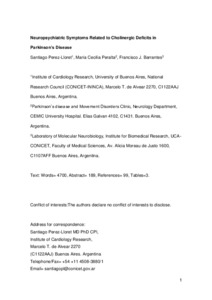Please use this identifier to cite or link to this item:
https://repositorio.uca.edu.ar/handle/123456789/9542| Título: | Neuropsychiatric symptoms related to cholinergic deficits in Parkinson’s disease | Autor: | Pérez Lloret, Santiago Peralta, María Cecilia Barrantes, Francisco José |
Palabras clave: | ENFERMEDAD DE PARKINSON; NEUROTRANSMISORES; ENFERMEDADES NEUROGENERATIVAS; TRATAMIENTO MEDICO | Fecha de publicación: | 2017 | Editorial: | Springer Nature | Cita: | Pérez Lloret, S., Peralta, M. C., Barrantes, F. J. Neuropsychiatric symptoms related to cholinergic deficits in Parkinson’s disease [en línea]. En: Gargiulo P., Mesones-Arroyo H. (eds.). Psychiatry and Neuroscience Update. Vol. II. Springer : Cham, 2017. doi:10.1007/978-3-319-17103-6 . Disponible en: https://repositorio.uca.edu.ar/handle/123456789/9542 | Resumen: | Abstract: Given its ability to explain the most frequent motor symptoms of Parkinson’s disease (PD), degeneration of dopaminergic neurons has been considered one of the disease´s main pathophysiological features. Several studies have shown that neurodegeneration also affects noradrenergic, serotoninergic, cholinergic and other monoaminergic neuronal populations. In this work, the characteristic contribution of cholinergic deficits to cognitive dysfunction, psychosis and sleep disturbances in PD and their treatment will be explored. Important neurophysiological processes at the root of several motor and cognitive functions remit to cholinergic neurotransmission at the synaptic pathway and circuital levels. The bulk of evidence highlights the link between cholinergic alterations and the aforementioned symptoms. The pathophysiology of these symptoms is related to degeneration of cholinergic nuclei, most importantly the nucleus basalis magnocellularis and the pedunculo-pontine nucleus. Rivastigmine, a drug that increases cholinergic tone by inhibiting the enzyme cholinesterase, is effective for dementia, whereas the use of Donepezil is still in the realm of investigation. Evidence on the clinical effects of these drugs for psychosis and REM-sleep disturbances is still weak. Anticholinergic drugs should be used with caution in PD, as they may aggravate these cholinergic symptoms. | URI: | https://repositorio.uca.edu.ar/handle/123456789/9542 | ISBN: | 978-3-319-17103-6 | Disciplina: | MEDICINA | DOI: | 10.1007/978-3-319-17103-6 | Derechos: | Acceso abierto | Fuente: | Gargiulo P., Mesones-Arroyo H. (eds.). Psychiatry and Neuroscience Update. Vol. II. Springer : Cham, 2017 |
| Appears in Collections: | Libros o partes de libro |
Files in This Item:
| File | Description | Size | Format | |
|---|---|---|---|---|
| neuropsychiatric-symptoms-related-cholinergic.pdf | 622,44 kB | Adobe PDF |  View/Open |
Page view(s)
257
checked on Feb 27, 2026
Download(s)
516
checked on Feb 27, 2026
Google ScholarTM
Check
Altmetric
Altmetric
This item is licensed under a Creative Commons License

